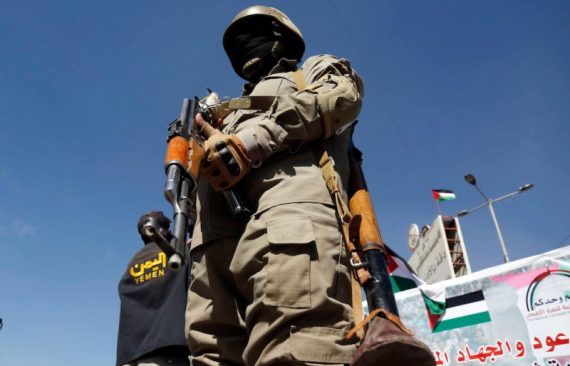I
n the past couple of months, the Houthis, operating from Yemen and backed by Iran, have executed a series of attacks on vessels navigating the Bab al Mandeb Strait in the Red Sea, specifically those associated with Israel or heading towards Israeli ports. Their declared objective is to dissuade Israel’s military actions in Gaza by calling upon global powers to exert substantial pressure on Tel Aviv.
This has prompted major players in the shipping industry, including A.P. Moller-Maersk A/S, Hapag-Lloyd AG, CMA CGM, Maersk, MSC, and the energy titan BP, to either suspend operations in the Red Sea or redirect their cargo vessels, resulting in a prolonged transportation period of three weeks and a considerable increase in costs.
In response, the United States formed a multinational naval coalition named “Operation Prosperity Guardian” to launch counterattacks against the Houthi forces. This move aimed to safeguard maritime interests and counteract the disruptions caused by the Houthis’ aggressive actions in the region, but its overall effectiveness in deterring the Houthis remains questionable so far.
Economic implications
Amid escalating attacks by the Houthi forces on cargo vessels, a region of paramount significance emerges—one that stands as a critical checkpoint on global trade routes. This area, overseeing 30% of the world’s maritime transit, now grapples with intensified costs. Infusing war risk premiums into insurance expenses has notably inflated the financial burden, soaring from 0.6% to a substantial 2% of the total cargo value.
The repercussions are not confined to the monetary realm alone; an elongated travel time, surpassing initial estimates by 30-50% due to the necessity of circumventing Africa, threatens to disrupt global supply chains. For instance, interconnected sectors face potential disruptions in the timely delivery of raw materials, adding another layer of complexity.
Amidst the prevailing atmosphere of uncertainty fuelled by these attacks, investor confidence in maritime-centric regional connectivity initiatives may experience a decline. For instance, the IMEC project, initially unveiled at the G20 Summit, is now shrouded in ambiguity regarding its future trajectory in the wake of the unsettling developments orchestrated by the Houthi attacks.
To solve this problem, an Eilat-based logistics start-up, Trucknet, offered an alternative, redirecting the seaborne trade route from the Red Sea to a land-based passage, envisions the seamless transportation of goods from Saudi Arabia through the UAE or Bahrain ports, culminating in their arrival at Israeli ports via land. Yet, the future of this alternative remains uncertain, as Houthi attacks occasionally extend to the western part of the Indian Ocean.
The Western response
In response to Houthi attacks, a multinational naval coalition led by Washington and named Operation Prosperity Guardian was formed in December. Initially, over 20 nations were announced to join the coalition with the United States. However, Spain, Italy, and France opted for a more autonomous approach to safeguarding freedom of navigation, deviating from American leadership in the declared operation. Consequently, the burden of the counterattack operation largely fell on the shoulders of the US and the UK. Both nations contribute aircraft carriers and destroyers, and a French frigate, although part of the group, operates independently.
Assessing the operation’s overall effectiveness reveals that, from its inception, it has struggled to establish a significant deterrent effect. Despite thwarting some Houthi missile attacks, shipping companies prefer to avoid the region. Additionally, the operation aims to deter the group by bombing land targets in Yemen; however, this strategy inadvertently strengthens the Houthis’ national and global image as an actor capable of resisting both the United States and Israel. Consequently, the group’s ongoing attacks contribute to a protracted state of conflict.
Recommended
What’s the endgame?
For many years, the U.S. coordinated with the Houthis, particularly after the fall of Sana’a and the capture of Al-Bayda. The American decision-makers used the same strategy in Yemen as in Iraq and Syria, namely, to use Shiite groups to eliminate Al-Qaeda and Daesh. In many instances, U.S. fighter jets pounded the locations of foes labelled by the Houthis as Daesh.
However, the heightened tensions in the Israeli-Palestinian conflict gave the Houthis a golden opportunity: First, their anti-Israeli posture earned them considerable legitimacy inside Yemen after a decade of civil war in which they could not prevail. Second, their stance earned them considerable clout in the Middle East after being considered a fringe group at best. Third, and more importantly, they strived to be recognised as an actor to be reckoned with militarily and security-wise in the south of the Red Sea and draw the world’s attention to their presence.
Amidst this complex scenario, a key question emerges: Why did the White House react the way it did? The U.S./UK military operations represent the Houthis’ best-case scenario, allowing them to fulfil their objectives. A more effective response could have been through economic sanctions that would dry their funding sources. But it seems the U.S. wants to send a message to Al-Houthi that they have to operate according to American rules of engagement, not Iranian ones. There is also another message to the region at large that the U.S. would not tolerate any action in support of Gaza.
As the situation stands, the most plausible scenario is the continuation and prolongation of Red Sea attacks. The Houthis are likely to persist in targeting vessels, prompting responses from the Anglo-American coalition, followed by retaliatory actions from the Houthi forces. This iterative cycle establishes a tit-for-tat dynamic that prolongs the intensity of the conflict for the foreseeable future and is a reminder that the U.S. is the conventional security provider in the region.





